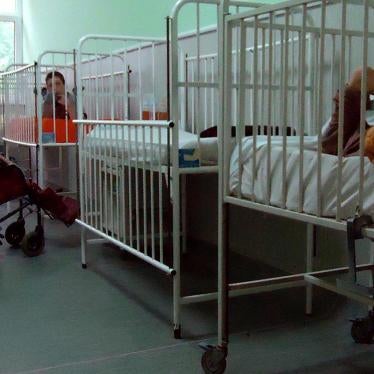I walked into a dimly lit, windowless room and saw “Anur,” who was struggling to stand up in the fenced area where he was confined. Other children with disabilities in the institutions I’ve visited were in rooms with as many as 10 children, with cribs lined on both sides. But Anur was all by himself.
He looked up at me with brown eyes and gave me a wide smile. He held out his arms. I kneeled down and hugged him over the fence. He chuckled and held on to me tightly. Suddenly, I heard rushed steps and concerned voices behind me: “Does she know?” “Did you tell her?” A caregiver walked up and cautiously asked: “Do you know he is HIV positive?”
At seven, Anur also has intellectual and physical disabilities. He is one of hundreds of children with disabilities I met in Serbia who live in large residential institutions, often far from their homes and families.
They may spend their entire lives in institutions, often isolated and neglected because there are not enough staff, and many parents don’t have the resources to visit. We found that the vast majority of the children in these institutions have no access to education. Many are confined to their beds without any stimulation or are kept subdued with mood-altering medication.
They grow up totally isolated from society, stunted in their emotional, physical, and intellectual development. They rarely, if ever, go outside.
The situation is particularly harsh for Anur. The staff in charge of caring for him told me that he does not go to school and is not allowed to eat or play with other children because the caregivers fear he could infect other children, even though HIV is not transmitted through casual contact.
“We had a girl with him for a while but then we took her out because we were worried about her safety,” a staff member told me. “We worried they could scratch each other.”
He has been living in isolation in this institution since he was a year old.
Seven years ago this week, Serbia ratified the UN Convention on the Rights of Persons with Disabilities, an international treaty that affirms that people with disabilities have the same rights as anyone else. This includes the right to live in the community, with support if need be. It requires an end to systematically institutionalizing children like Anur.
Yet, seven years on, Serbia has no comprehensive plan to move children and adults with disabilities out of institutions and to support them to live independently. Almost 11,000 people with disabilities live in Serbian institutions – the majority of whom entered as children. When I asked some of them how long they had lived in institutions, over and over again, I would hear: “Ever since I was little.”
However, there is reason for hope. In a meeting with Human Rights Watch in June, the Serbian government promised to adopt a de-institutionalization plan and end the routine placement of children with disabilities behind institutional walls.
But the government needs to do more than just talk about de-institutionalization. It needs to act on its promise. It should also ensure that children with disabilities have equal access to quality education. As a matter of urgency, Serbia should take steps to end neglect, isolation, segregation, inappropriate psychiatric treatment and discrimination against children with disabilities in institutions.
The day I met Anur, we played for a bit, throwing a ball between us, inside and out of the fenced space. When I had to leave him and the windowless room where he spends all his days and nights, I kneeled down again and told him I had to go and meet other children.
His smile disappeared and his eyes went sad. He grabbed me and held onto my hand with all the strength he could muster, not wanting to let me go.
A child should not be isolated from their family or community or denied the chance to play, eat and be with other children because they have a disability - regardless of the severity. Anur, and so many more children like him, need to be included in our communities and schools. It’s not only about human needs, it’s about human rights.






